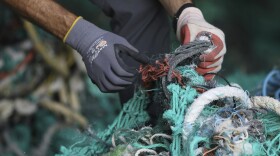Hawai‘i is often referred to as one of the most racially-diverse states in the union, a melting pot of humanity. But some combinations in the pot are rarer than others – like African-American Native Hawaiians, whose ancestors on both sides have struggled with identity through history. HPR’s Ku‘uwehi Hiraishi has this story.
Every Sunday after church, members of the Lynch family meet at Grandma Mildred’s house in Wai‘anae. The women are sitting around the table catching up on the latest in family updates. The men are manning the barbeque. And the kids are playing basketball in the driveway.

“Our family, so if you look at our entire family we have every shade from light to dark,” says 49-year-old Vicki Wailani Lynch.
Lynch sits across the table from Grandma Mildred Helelani Hinton-Lynch, and they are talking race. Vicki is noticeably black, Grandma Mildred not so much. But they are both native Hawaiian and African-American. 87-year-old Grandma Mildred remembers what it was like growing up in the 1930s.
“There was no difference. You know?” says Hinton-Lynch, “I mean whether you were half-Chinese, half-Japanese, half-Black, half-whatever. Nobody made a difference. You were just local.”
The family’s black lineage is traced back to Mildred’s father Gaston Hinton who came to Hawai‘i from North Carolina in 1919. He met Mildred’s native Hawaiian mother while serving in the Navy. But Mildred says she never learned much about black culture from her father.

“We didn’t know what he went through because he never talked about his upbringing,” says Hinton-Lynch.
It wasn’t until living on the mainland for 20 years with her husband, a black man named Andrew Lynch, that Mildred experienced prejudice against black people.
“We started seeing the differences in how the whites treated the blacks and they were separate,” says Hinton-Lynch, “And we couldn’t understand that because we were all mixed up.”
Vicki, on the other hand, grew up in Wai‘anae, a community with a high native Hawaiian population. As she put it, she looks more “obviously black” than the rest of her family – and that proved to be a challenge growing up.

“If anything I think living in Hawai’i. I’ve experienced more racism from Hawaiians,” says Lynch, “Like who do you think you are dancing hula? When you don’t look like a hula dancer.”
She holds no grudges about it but she says the community’s acceptance of her blackness and her own acceptance of her blackness are two different things.
“The deeper story of what I see is self-identity. Self-worth,” says Lynch, “It’s kinda hard when you hardly had it, or never had it, or barely had it. And that’s not just our Hawaiian culture but our black culture.”
It’s difficult to know just how many African-American-Native-Hawaiians live in Hawai‘i. Despite a long history in Hawai‘i dating back to the end of the 18th century, all African-Americans – including those with Native Hawaiian ancestry - only make up about three percent of Hawai‘i’s population.




